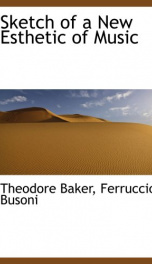sketch of a new esthetic of music

A NEW ESTHETIC OF MUSIC OF A New Esthetic of Music BY FERRUCCIO BUSONI TRANSLATED FROM THE GERMAN BY DR. TH. BAKER NEW YORK G. SCHIRMER 1911 Copyright, 1907 By FERRUCCIO BUSONI Copyright, 1911 By G. SCHIRMER 22375 JUL , SKETCH OF A NEW ESTHETIC OF MUSIC quot What seek you Say And what do you expect quot I know not what the Unknown I would have What s known to me, is endless I would go Beyond the end The last word still is wanting. quot quot JDer macfitige T OOSELY joined together as regards literary - L form, the following notes are, in reality, the outcome of convictions long held and slowly ma tured. In them a problem of the first magnitude is formulated with apparent simplicity, without giv ing the key to its final solution for the problem cannot be solved for generations if at all. But it involves an innumerable series of lesser problems, which I present to the consideration of those whom they may concern. For it is a long time since any one has devoted himself to earnest musical research. It is true, that admirable works of genius arise in every period, and I have always taken my stand in the front rank of those who joyfully acclaimed the passing standard-bearers and still it seems to me that of all these beautiful paths leading so far afield none lead upward. 2 A NEW ESTHETIC OF MUSIC The spirit of an art-work, the measure of emotion, of humanity, that is in it these remain unchanged in value through changing years the form which these three assumed, the manner of their expression, and the fiawr of the epoch which gave them birth, are transient and age rapidly. Spirit and emotion retain their essence, In the art-work as in man himself we admire technical achievements, yet they are outstripped, or cloy the taste and are discarded. Its ephemeral qualities give a work the stamp of quot modernity quot its unchangeable essence hinders it from becoming quot obsolete. quot Among both quot mod ern quot and quot old quot works we find good and bad, genuine and spurious. There is nothing properly modern only things which have come into bring earlier or later longer in bloom, or sooner withered. The Modern and the Old have always been. Art-forms are the more lasting, the more closely they adhere to the nature of their individual species of art, the purer they keep their essential means and ends. Sculpture relinquishes the expression of the human pupil, and effects of color painting degener ates, when it forsakes the flat surface in depictioe and takes on complexity in theatrical decoration or panoramic portrayal. Architecture has its fundamental form, growth fern below upward, prescribed by static necessity and K amp gt of necessarily provide the infer CHARACTERIZATION OF THE ARTS 3 mediate and finishing configuration these are eternal and inviolable requirements of the art. Poetry commands the abstract thought, which it clothes in words. More independent than the others, it reaches the furthest bounds. But all arts, resources and forms ever aim at the one end, namely, the imitation of nature and the interpretation of human feelings. Architecture, sculpture, poetry and painting are old and mature arts their conceptions are estab lished and their objects assured they have found the way through uncounted centuries, and, like the planets, describe their regular orbits. Music, compared with them, is a child that has learned to walk, but must still be led. It is a virgin art, without experience in life and suffering. It is all unconscious as yet of what garb is becoming, of its own advantages, its unawakened capacities. And again, it is a child-marvel that is already able to dispense much of beauty, that has already brought joy to many, and whose gifts are commonly held to have attained full maturity... --This text refers to an alternate Paperback edition.
Info about the book
Author:
Series:
Unknown
ISBN:
1116858568
Rating:
3/5 (4)Your rating:
0/5
Languge:
English
Users who have this book
Users who want this book
What readers are saying
What do you think? Write your own comment on this book!
write a commentif you like sketch of a new esthetic of music try:
Other books by this author
Do you want to read a book that interests you? It’s EASY!
Create an account and send a request for reading to other users on the Webpage of the book!

